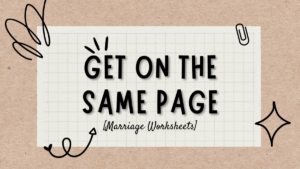4 Hacks to Resolve Marriage Conflict

By Jimmy Sliwa
I can remember telling my marriage counselor that my wife and I rarely ever argue. Expecting him to be impressed, I was quite surprised to hear him say that “never arguing is NOT a good thing.”
“You mean to tell me that marital conflict is good?” – Me with a puzzled look.
Well, that depends.
My counselor shared that conflict in marriage is inevitable. And if you learn to resolve conflict in a healthy manner then your marriage can progress.
You see, ALL marriages have conflict. Even if it’s not apparent on the outside, all couples will have conflicting points of view. One thing that separates healthy couples from unhealthy couples is how conflict is handled.
According to Dr. Gottman from the Gottman Institute, unhealthy couples handle conflict in four main ways: Criticism, Contempt, Defensiveness, and Stonewalling. He dubbed these four unhealthy patterns the four horsemen because he can predict whether a couple is headed for divorce based upon these characteristics. Whoa!
Obviously, it is prudent to avoid the four horsemen when experiencing conflict in marriage. But just avoiding criticism, contempt, defensiveness, and stonewalling doesn’t resolve a conflict. Sometimes you need to exercise other strategies to come to a healthy conflict resolution.
What do you do when you can’t seem to resolve conflict in your marriage?
What do you do when your spouse doesn’t seem to be receiving your point of view?
Don’t give up.
Instead try these 4 Hacks that can help you resolve conflict in marriage.

1. Write a Letter
If you can’t find common ground by talking, try writing a letter to your spouse. This helps you formulate your thoughts carefully and without placing judgement on your spouse.
The point of the letter should be to explain your point of view to your spouse as well as share how it makes you feel. Avoid pointing the finger and casting shade on your partner. Instead, aim to acknowledge how they may be feeling and be vulnerable in sharing your own emotions.
My wife and I communicated through letters quite often when she found out about my pornography addiction. She was so crushed, disappointed, and angry with me that we had a hard time resolving the conflict.
Writing letters back and forth gave us a chance to formulate our thoughts without being in the heat of the moment. I have even kept her letters to this day so that I can be reminded of the emotional roller coaster I put her through by lying to her.
If you are having trouble seeing “eye-to-eye,” try writing a letter to your spouse.
2. "Before You Correct - Connect"
Before you go and correct your spouse, be sure to connect with them. What I mean by connect is to bond emotionally.
Don’t jump into a difficult conversation with your spouse without first addressing them politely. A gentle kiss on the forehead and a “how are you doing” can set a more calm mood.
So before you correct – connect.
An example of this.
- If I saw that my wife had left the garage door open when I got home from work, I shouldn’t burst into the home and instantly snap at her. Instead it would be more beneficial to address her with a “it’s good to see you” and maybe a hug or kiss on the cheek. Only after connecting to her would it be a good idea to let her know about her mistakes and the frustrations that I have.
3. Use an Emotion Dictionary
I don’t know if it’s just a guy thing, but most of the time I don’t have the vocabulary to describe how I am feeling. Maybe this is why I’ll say “I’m fine” when really, I am not.
If you find that you struggle to describe your emotions and share how you actually feel, you may benefit from an emotion dictionary. Research demonstrates that just understanding your emotions is beneficial for controlling anger, anxiety, and fear. In addition, it may help you act more appropriately to the situation rather than suppress your emotions.
When in conflict with your spouse it is important that they can understand how you feel. This vulnerability allows them to get in your corner and see from your perspective.
If you struggle to put a name to your feelings try an emotion dictionary to help you gain clarity on you feelings. Google “list of emotions” to see 300+ list of emotions you can choose from.
4. Use Metaphors to Describe Your Feelings
This was a tip that my counselor shared with me.
Use metaphors to describe how you feel. The use of metaphors are a terrific way to explain the situation and how it affects you. It allows your partner to see from a new and fresh perspective. It also gives that an opportunity to connect on a deeper level.
For example: If I was in a financial argument with my wife, I might say something like this.
- “I feel like when we don’t stick to the budget that we are on a boat that is sinking in the middle of the ocean. I’m afraid that if we sink too far we will be completely drowned in debt.”
Can you see how this humanizes my fears? Instead of pointing the finger and blaming my wife, using metaphors gives her a better perspective to my own personal fears and struggles. Use metaphors to gain better clarity.


![Read more about the article Free Date Night Invites [Printable]](https://thehusbandsclub.com/wp-content/uploads/2022/07/FD525312-840A-4677-8BD0-E33748D4A265-1-e1673251799714-300x169.png)